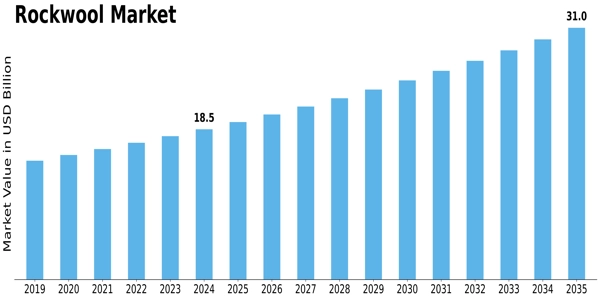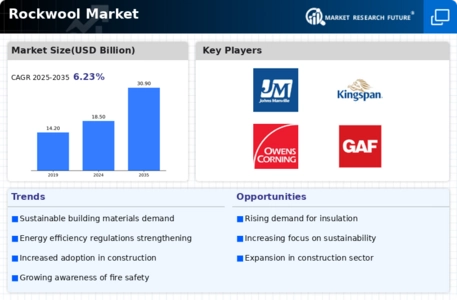Rockwool Size
Rockwool Market Growth Projections and Opportunities
The Rockwool market is influenced by a combination of factors that contribute to its growth and dynamics within the construction, insulation, and horticulture industries. Thermal efficiency, fire resistance, and sustainability are primary drivers impacting the market, as Rockwool, a mineral wool insulation material, is widely used for its excellent insulating properties and versatile applications. Rockwool is composed of volcanic rock and other natural materials, making it fire-resistant and an effective thermal insulator. The demand for energy-efficient, fire-safe, and environmentally sustainable insulation solutions contributes to the growth of the Rockwool market, meeting the diverse needs of construction projects and agricultural applications globally.
Economic factors play a crucial role in the Rockwool market. Construction activities, industrial projects, and infrastructure development impact the demand for insulation materials, subsequently influencing the market for Rockwool. During periods of economic growth, there is often an increase in construction and retrofitting projects, leading to higher demand for energy-efficient insulation solutions. Conversely, economic downturns may result in reduced investments in construction and building maintenance, affecting the market negatively. Monitoring economic trends is essential for stakeholders in the construction and insulation sectors to make informed business decisions and adapt to market fluctuations.
Technological advancements contribute to innovation in the Rockwool market. Continuous improvements in manufacturing processes, product formulations, and applications enhance the performance, efficiency, and environmental profile of Rockwool. Advanced Rockwool products may feature enhanced thermal resistance, moisture repellency, and ease of installation. Innovations in product design, such as tailored solutions for specific applications, contribute to the development of high-performance and customizable Rockwool insulation. Manufacturers that invest in cutting-edge technologies gain a competitive edge by offering insulation solutions that meet evolving building codes, energy efficiency standards, and customer preferences.
Environmental considerations significantly influence the Rockwool market. With a growing emphasis on sustainability and eco-friendly building practices, there is an increasing demand for insulation materials that minimize environmental impact. Rockwool, being a natural and recyclable material, aligns with the green building movement. Its inert composition makes it resistant to mold and mildew, contributing to healthier indoor air quality. Additionally, compliance with environmental regulations and certifications, such as LEED (Leadership in Energy and Environmental Design), enhances the market positioning of Rockwool. Government initiatives promoting energy efficiency and sustainable construction practices further encourage the adoption of Rockwool insulation.
Consumer preferences for energy-efficient and environmentally friendly building materials significantly influence the Rockwool market. Builders, architects, and homeowners prioritize insulation solutions that not only provide effective thermal performance but also contribute to sustainability goals. Rockwool's versatility in various applications, including residential, commercial, and industrial construction, caters to the diverse needs of consumers. The market is further driven by the increasing demand for insulation materials that offer not only superior thermal properties but also fire resistance, sound absorption, and long-term durability.
Market competition in the Rockwool industry is shaped by factors such as pricing, performance features, and brand reputation. Competitive pricing strategies that consider production costs, energy efficiency, and market demand influence a company's market position. Building a strong reputation for providing reliable, efficient, and environmentally friendly Rockwool insulation is crucial for attracting and retaining customers. Effective marketing strategies, technical support, and after-sales service contribute to brand loyalty. Manufacturers and distributors must navigate these competitive factors strategically to establish a strong presence in the Rockwool market.

















Leave a Comment